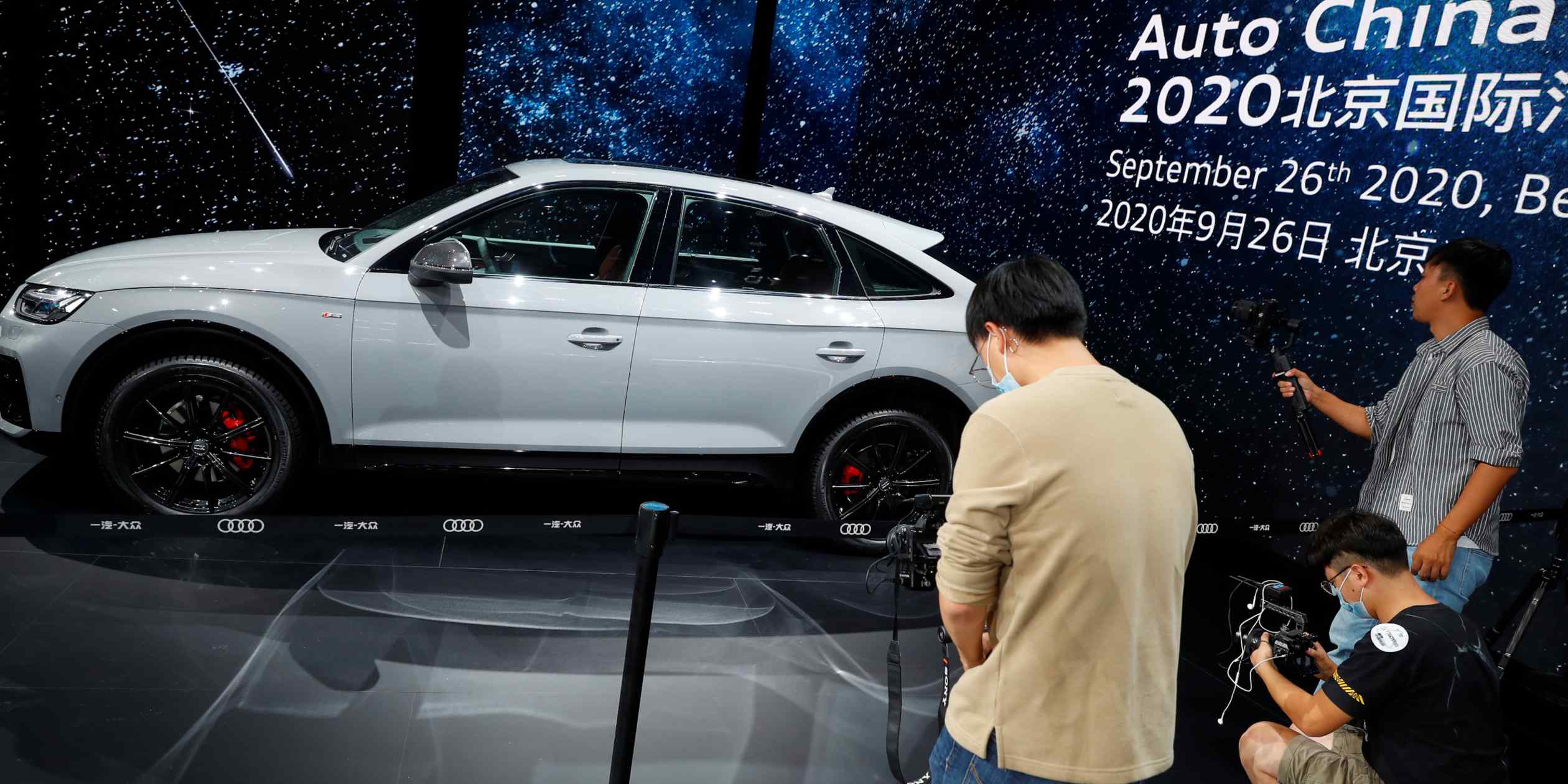Why Are BMW And Porsche Facing Difficulties In China? A Deep Dive

Table of Contents
Intensifying Competition from Local and International Brands
The Chinese luxury car market is no longer a playground for established international players. BMW and Porsche are facing a dual threat: the rise of domestic brands and aggressive strategies from other global competitors.
The Rise of Chinese Luxury Automakers
Chinese luxury automakers are rapidly gaining market share, leveraging competitive pricing and technologically advanced features to attract discerning buyers. This presents a significant challenge to established brands like BMW and Porsche.
- Examples of successful Chinese luxury models: Hongqi H9, BYD's Yangwang U8, Nio ET7. These models are increasingly competing with BMW 5 Series and Porsche Cayenne equivalents.
- Appealing features for Chinese consumers: Advanced driver-assistance systems (ADAS), large touchscreens with sophisticated infotainment systems, and increasingly, fully electric vehicle (EV) options are key differentiators. The focus on technology and connectivity is particularly resonant with the younger, tech-savvy Chinese consumer.
Aggressive Strategies from Established International Competitors
Other international luxury brands aren't standing still. Mercedes-Benz, Audi, and Tesla, among others, are employing aggressive strategies to capture a larger slice of the Chinese market.
- Marketing campaigns and new model launches: Competitors are investing heavily in targeted marketing campaigns tailored to the Chinese market, and are frequently launching new models specifically designed for Chinese consumer preferences.
- Competitive advantages: Brands like Tesla have capitalized on the growing demand for EVs, while Mercedes-Benz and Audi continuously refine their offerings, emphasizing customization options and localized services. Their established brand recognition and extensive dealership networks also provide a strong competitive edge.
Evolving Consumer Preferences in the Chinese Market
Understanding the shifting consumer preferences in China is critical to deciphering the challenges faced by BMW and Porsche. Two key trends are reshaping the market: the surge in EV adoption and the increasing emphasis on technology and digitalization.
The Shift Towards Electric Vehicles (EVs)
China is a global leader in EV adoption, and this trend is significantly impacting the luxury car segment. BMW and Porsche, while offering EVs, haven't yet matched the pace of competitors in this crucial area.
- Comparison of EV offerings: Competitors like Tesla, Nio, and BYD offer a wider range of fully electric luxury vehicles, sometimes at more competitive price points. BMW and Porsche's EV portfolios, while growing, still lag in terms of model variety and range in some segments.
- Charging infrastructure and government incentives: The extensive charging infrastructure and substantial government subsidies in China are further accelerating EV adoption, placing pressure on BMW and Porsche to accelerate their EV strategies.
Emphasis on Technology and Digitalization
Chinese luxury car buyers are increasingly tech-savvy and prioritize advanced technology and connected car features. This necessitates a significant focus on digitalization by all players in the market.
- In-car connectivity, infotainment, and autonomous driving: Features like advanced infotainment systems, seamless smartphone integration, and advanced driver-assistance systems (ADAS) are crucial for attracting Chinese consumers.
- Digital marketing and online sales: Effectively leveraging digital marketing platforms and establishing robust online sales channels is vital for reaching the tech-savvy Chinese customer.
Macroeconomic Factors and Geopolitical Influences
Beyond industry-specific trends, macroeconomic conditions and geopolitical factors also play a role in the challenges faced by BMW and Porsche in China.
Economic Slowdown and Consumer Spending
China's recent economic slowdown has dampened consumer spending, particularly in the luxury segment. This directly impacts demand for premium vehicles like BMWs and Porsches.
- Economic indicators: Factors such as GDP growth, inflation, and consumer confidence directly influence purchase decisions for luxury goods. A slowing economy often leads to reduced discretionary spending.
- Impact on luxury car purchases: Consumers are more likely to postpone large purchases like luxury cars during economic uncertainty.
Geopolitical Risks and Trade Tensions
Geopolitical tensions and trade disputes can also influence the performance of international companies operating in China.
- Political and trade issues: While not directly impacting sales in the same way as economic downturns, escalating geopolitical tensions can introduce uncertainty and potentially impact supply chains or regulatory environments.
- Future risks: Navigating the complex geopolitical landscape and adapting to potential regulatory changes will be crucial for maintaining a stable presence in the Chinese market.
Conclusion: Understanding and Addressing the Challenges Facing BMW and Porsche in China
The BMW and Porsche difficulties in China stem from a confluence of factors: intensified competition from both local and international brands, evolving consumer preferences towards EVs and advanced technologies, and macroeconomic headwinds. Understanding these complexities requires continuous monitoring of market trends. Successfully navigating this challenging market demands a proactive approach: accelerating EV development and deployment, enhancing technological offerings, and adopting sophisticated digital marketing strategies are all crucial for regaining market share. Further research is crucial to fully grasp the evolving dynamics of this critical market. Addressing these challenges effectively will determine the future success of BMW and Porsche in this vital automotive market.

Featured Posts
-
 Discover The Best New R And B Featuring Leon Thomas And Flo
May 24, 2025
Discover The Best New R And B Featuring Leon Thomas And Flo
May 24, 2025 -
 Konchita Vurst Prognoz Pobediteley Evrovideniya 2025
May 24, 2025
Konchita Vurst Prognoz Pobediteley Evrovideniya 2025
May 24, 2025 -
 One Analyst Forecasts 254 For Apple Stock Time To Buy
May 24, 2025
One Analyst Forecasts 254 For Apple Stock Time To Buy
May 24, 2025 -
 Ritka Porsche 911 Csak Az Extrak 80 Millio Forintba Kerueltek
May 24, 2025
Ritka Porsche 911 Csak Az Extrak 80 Millio Forintba Kerueltek
May 24, 2025 -
 Dow Jones Index Cautious Climb Continues After Strong Pmi Data
May 24, 2025
Dow Jones Index Cautious Climb Continues After Strong Pmi Data
May 24, 2025
Latest Posts
-
 Billie Jean King Cup Kazakhstan Defeats Australia In Qualifying Match
May 24, 2025
Billie Jean King Cup Kazakhstan Defeats Australia In Qualifying Match
May 24, 2025 -
 Kazakhstan Triumphs Over Australia In Billie Jean King Cup Qualifier
May 24, 2025
Kazakhstan Triumphs Over Australia In Billie Jean King Cup Qualifier
May 24, 2025 -
 Kazakhstans Billie Jean King Cup Victory Over Australia
May 24, 2025
Kazakhstans Billie Jean King Cup Victory Over Australia
May 24, 2025 -
 Italian Open Gaubas Scores Victory Over Shapovalov
May 24, 2025
Italian Open Gaubas Scores Victory Over Shapovalov
May 24, 2025 -
 Kazakhstan Stuns Australia In Billie Jean King Cup Qualifier
May 24, 2025
Kazakhstan Stuns Australia In Billie Jean King Cup Qualifier
May 24, 2025
